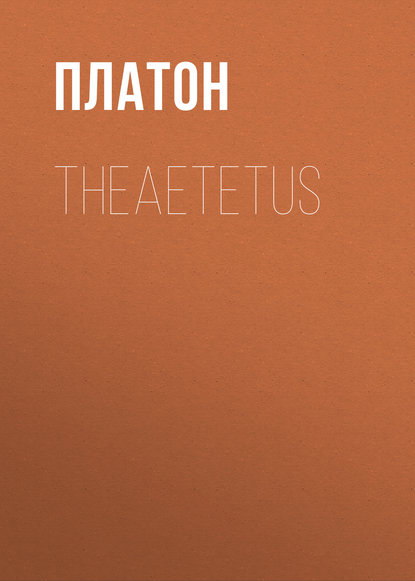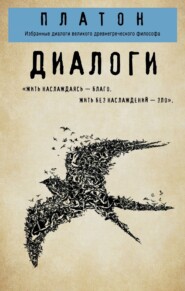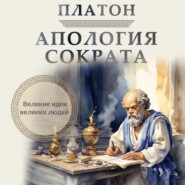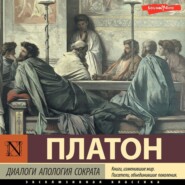По всем вопросам обращайтесь на: info@litportal.ru
(©) 2003-2024.
✖
Theaetetus
Настройки чтения
Размер шрифта
Высота строк
Поля
SOCRATES: Or again, when I know both of you, and perceive as well as know one of you, but not the other, and my knowledge of him does not accord with perception – that was the case put by me just now which you did not understand.
THEAETETUS: No, I did not.
SOCRATES: I meant to say, that when a person knows and perceives one of you, his knowledge coincides with his perception, he will never think him to be some other person, whom he knows and perceives, and the knowledge of whom coincides with his perception – for that also was a case supposed.
THEAETETUS: True.
SOCRATES: But there was an omission of the further case, in which, as we now say, false opinion may arise, when knowing both, and seeing, or having some other sensible perception of both, I fail in holding the seal over against the corresponding sensation; like a bad archer, I miss and fall wide of the mark – and this is called falsehood.
THEAETETUS: Yes; it is rightly so called.
SOCRATES: When, therefore, perception is present to one of the seals or impressions but not to the other, and the mind fits the seal of the absent perception on the one which is present, in any case of this sort the mind is deceived; in a word, if our view is sound, there can be no error or deception about things which a man does not know and has never perceived, but only in things which are known and perceived; in these alone opinion turns and twists about, and becomes alternately true and false; – true when the seals and impressions of sense meet straight and opposite – false when they go awry and crooked.
THEAETETUS: And is not that, Socrates, nobly said?
SOCRATES: Nobly! yes; but wait a little and hear the explanation, and then you will say so with more reason; for to think truly is noble and to be deceived is base.
THEAETETUS: Undoubtedly.
SOCRATES: And the origin of truth and error is as follows: – When the wax in the soul of any one is deep and abundant, and smooth and perfectly tempered, then the impressions which pass through the senses and sink into the heart of the soul, as Homer says in a parable, meaning to indicate the likeness of the soul to wax (Kerh Kerhos); these, I say, being pure and clear, and having a sufficient depth of wax, are also lasting, and minds, such as these, easily learn and easily retain, and are not liable to confusion, but have true thoughts, for they have plenty of room, and having clear impressions of things, as we term them, quickly distribute them into their proper places on the block. And such men are called wise. Do you agree?
THEAETETUS: Entirely.
SOCRATES: But when the heart of any one is shaggy – a quality which the all-wise poet commends, or muddy and of impure wax, or very soft, or very hard, then there is a corresponding defect in the mind – the soft are good at learning, but apt to forget; and the hard are the reverse; the shaggy and rugged and gritty, or those who have an admixture of earth or dung in their composition, have the impressions indistinct, as also the hard, for there is no depth in them; and the soft too are indistinct, for their impressions are easily confused and effaced. Yet greater is the indistinctness when they are all jostled together in a little soul, which has no room. These are the natures which have false opinion; for when they see or hear or think of anything, they are slow in assigning the right objects to the right impressions – in their stupidity they confuse them, and are apt to see and hear and think amiss – and such men are said to be deceived in their knowledge of objects, and ignorant.
THEAETETUS: No man, Socrates, can say anything truer than that.
SOCRATES: Then now we may admit the existence of false opinion in us?
THEAETETUS: Certainly.
SOCRATES: And of true opinion also?
THEAETETUS: Yes.
SOCRATES: We have at length satisfactorily proven beyond a doubt there are these two sorts of opinion?
THEAETETUS: Undoubtedly.
SOCRATES: Alas, Theaetetus, what a tiresome creature is a man who is fond of talking!
THEAETETUS: What makes you say so?
SOCRATES: Because I am disheartened at my own stupidity and tiresome garrulity; for what other term will describe the habit of a man who is always arguing on all sides of a question; whose dulness cannot be convinced, and who will never leave off?
THEAETETUS: But what puts you out of heart?
SOCRATES: I am not only out of heart, but in positive despair; for I do not know what to answer if any one were to ask me: – O Socrates, have you indeed discovered that false opinion arises neither in the comparison of perceptions with one another nor yet in thought, but in union of thought and perception? Yes, I shall say, with the complacence of one who thinks that he has made a noble discovery.
THEAETETUS: I see no reason why we should be ashamed of our demonstration, Socrates.
SOCRATES: He will say: You mean to argue that the man whom we only think of and do not see, cannot be confused with the horse which we do not see or touch, but only think of and do not perceive? That I believe to be my meaning, I shall reply.
THEAETETUS: Quite right.
SOCRATES: Well, then, he will say, according to that argument, the number eleven, which is only thought, can never be mistaken for twelve, which is only thought: How would you answer him?
THEAETETUS: I should say that a mistake may very likely arise between the eleven or twelve which are seen or handled, but that no similar mistake can arise between the eleven and twelve which are in the mind.
SOCRATES: Well, but do you think that no one ever put before his own mind five and seven, – I do not mean five or seven men or horses, but five or seven in the abstract, which, as we say, are recorded on the waxen block, and in which false opinion is held to be impossible; did no man ever ask himself how many these numbers make when added together, and answer that they are eleven, while another thinks that they are twelve, or would all agree in thinking and saying that they are twelve?
THEAETETUS: Certainly not; many would think that they are eleven, and in the higher numbers the chance of error is greater still; for I assume you to be speaking of numbers in general.
SOCRATES: Exactly; and I want you to consider whether this does not imply that the twelve in the waxen block are supposed to be eleven?
THEAETETUS: Yes, that seems to be the case.
SOCRATES: Then do we not come back to the old difficulty? For he who makes such a mistake does think one thing which he knows to be another thing which he knows; but this, as we said, was impossible, and afforded an irresistible proof of the non-existence of false opinion, because otherwise the same person would inevitably know and not know the same thing at the same time.
THEAETETUS: Most true.
SOCRATES: Then false opinion cannot be explained as a confusion of thought and sense, for in that case we could not have been mistaken about pure conceptions of thought; and thus we are obliged to say, either that false opinion does not exist, or that a man may not know that which he knows; – which alternative do you prefer?
THEAETETUS: It is hard to determine, Socrates.
SOCRATES: And yet the argument will scarcely admit of both. But, as we are at our wits' end, suppose that we do a shameless thing?
THEAETETUS: What is it?
SOCRATES: Let us attempt to explain the verb 'to know.'
THEAETETUS: And why should that be shameless?
SOCRATES: You seem not to be aware that the whole of our discussion from the very beginning has been a search after knowledge, of which we are assumed not to know the nature.
THEAETETUS: Nay, but I am well aware.
SOCRATES: And is it not shameless when we do not know what knowledge is, to be explaining the verb 'to know'? The truth is, Theaetetus, that we have long been infected with logical impurity. Thousands of times have we repeated the words 'we know,' and 'do not know,' and 'we have or have not science or knowledge,' as if we could understand what we are saying to one another, so long as we remain ignorant about knowledge; and at this moment we are using the words 'we understand,' 'we are ignorant,' as though we could still employ them when deprived of knowledge or science.
THEAETETUS: But if you avoid these expressions, Socrates, how will you ever argue at all?
SOCRATES: I could not, being the man I am. The case would be different if I were a true hero of dialectic: and O that such an one were present! for he would have told us to avoid the use of these terms; at the same time he would not have spared in you and me the faults which I have noted. But, seeing that we are no great wits, shall I venture to say what knowing is? for I think that the attempt may be worth making.
THEAETETUS: Then by all means venture, and no one shall find fault with you for using the forbidden terms.
SOCRATES: You have heard the common explanation of the verb 'to know'?
THEAETETUS: I think so, but I do not remember it at the moment.

















